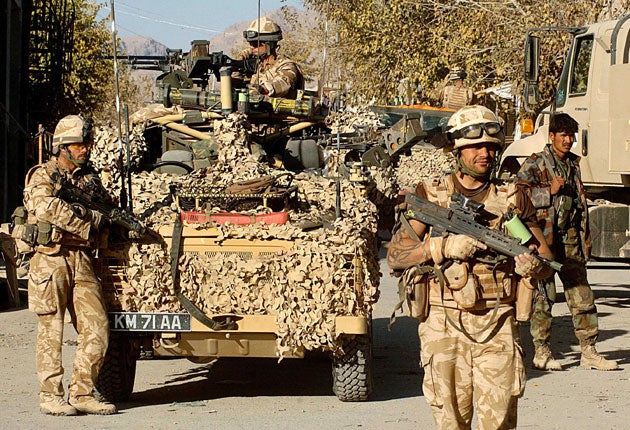Give veterans mental health checks every year, say Tories
Growing numbers coming home from war are suffering post-traumatic disorders

Your support helps us to tell the story
From reproductive rights to climate change to Big Tech, The Independent is on the ground when the story is developing. Whether it's investigating the financials of Elon Musk's pro-Trump PAC or producing our latest documentary, 'The A Word', which shines a light on the American women fighting for reproductive rights, we know how important it is to parse out the facts from the messaging.
At such a critical moment in US history, we need reporters on the ground. Your donation allows us to keep sending journalists to speak to both sides of the story.
The Independent is trusted by Americans across the entire political spectrum. And unlike many other quality news outlets, we choose not to lock Americans out of our reporting and analysis with paywalls. We believe quality journalism should be available to everyone, paid for by those who can afford it.
Your support makes all the difference.Military veterans would be offered annual mental health checks under Tory plans to combat soaring numbers suffering post-traumatic stress disorder, depression and drink problems.
The moves, The Independent has learnt, are in response to fears that thousands of former service personnel returning from Iraq and Afghanistan will need psychological help over the next decade.
Critics say the NHS needs to do more to keep track of ex-soldiers, particularly among the thousands who have seen action in recent years.
More than 2,000 Iraq veterans have already been diagnosed with post-traumatic stress disorder, which can take as long as 15 years to develop.
One in 10 prison inmates is a former serviceman, and a survey last year found more than one in 20 people sleeping rough in London had been in the forces.
A veterans' charity said it is currently treating 3,800 former service men and women with mental illness. But many more suffer in silence, either because they do not recognise their symptoms, or because they are too proud to ask for help.
The Conservatives are now drafting plans to contact all veterans every year to check on their mental health.
The aim is to detect early symptoms, including difficulty sleeping or eating, or severe mood swings, before they escalate into more acute problems. The party intends to introduce the scheme early in a Conservative administration. It has started discreet talks with one hospital trust on how it might work in practice. Veterans would be contacted annually – either with a telephone call or questionnaire – to check they have adjusted smoothly to civilian life.
Liam Fox, the shadow Defence Secretary, accused the Government of giving a low priority to former service personnel. He said: "You simply can't trust to luck the psychological well-being of people who have been willing to risk life and limb for our security. We must not allow these people to slip through the net."
David Hill, director of operations for the charity Combat Stress, said it currently cares for 3,800 ex-servicemen and women, including 222 from the Iraq war and 37 from Afghanistan. He said: "By the time they come to us, their family life has broken down, their job has gone, they have spiralled down as far as it is possible to go.
"Anything that is going to help veterans get help has to be good. Screening can be useful, but it has to be done with sensitivity."
A spokesman for the Department of Health said it is examining ways of "helping better identify and treat veterans with mental health problems, and ensuring continuity of care".
Life after war: 'Without the help I received, I wouldn't be here today'
Alec Webster, 35, is married with three children and has suffered acute anxiety and panic attacks since leaving the Army in 2000...
"I served in the Scots Guards for 10 years between 1990 and 2000. I'm from Dundee, and my family all served in the Army, so it was the natural career for me.
In 1991, I was sent to Iraq for the first Gulf War, I then did three tours of Northern Ireland, and went to Afghanistan with the TA. One of the worst personal experiences I had was a Land Rover crash in Northern Ireland which landed me in hospital for months.
When you are in the army you never think about the stress you are under and the effects it might have on you. You think you're bullet-proof. You just bury all the health issues because you don't want to appear weak. But you are definitely aware once you leave.
Since I left, I've suffered from a short temper, anxiety attacks and insomnia. It makes returning to civvie street extremely difficult. I was helped by the charity Combat Stress, and I can honestly say I wouldn't be here today if it wasn't for them. When you get your discharge papers, all you get in them is a pamphlet for the British Legion but they need to also tell you about the other services out there."
Join our commenting forum
Join thought-provoking conversations, follow other Independent readers and see their replies
Comments